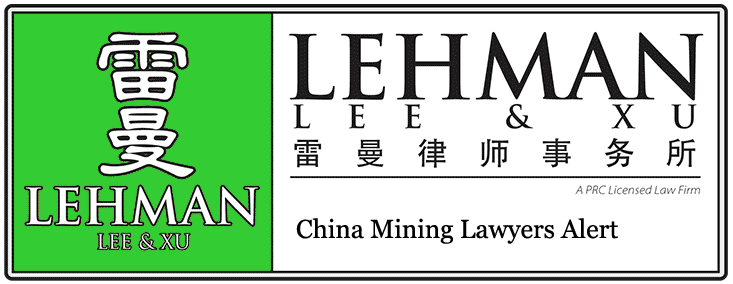
 |
|
LEHMAN, LEE & XU China Lawyers
|
|
China Mining Lawyers Alert
|
|
December 2013
|
The China Law News keeps you on top of business, economic and political events in the China. |
|
|
|
In the News |
Go-Ahead for Indonesia's Controversial Ban on Unprocessed Mineral Exports |
Starting from 12 January 2014, the export of all mineral-ores is banned in Indonesia. This controversial new policy, stipulated by the 2009 Mining Law (on Minerals and Coal Mining), was agreed upon by the nine fractions in Commission VII of the Indonesian parliament (DPR). Through this new law, the government intends to increase the value of exports while reducing dependence on raw exports and thus becoming less vulnerable to price downswings on the global commodities market. Indonesia - blessed by an abundance of commodities - is a major commodity exporting country. Commodities account for around 60 percent of the country's exports. Most of these, however, are unprocessed ones. Mining accounts for about 12 percent of gross domestic product (GDP) of Southeast Asia's largest economy. In the past decade, the country has shipped most of its mining materials to China. The 2009 Mining Law stipulates that ore needs to be processed domestically first before it is allowed to be exported. As such, Indonesian mining companies are forced to build smelters. Previously, the government of Indonesia stated that those companies that have submitted plans to build a smelter would receive a temporary exemption from the new law. Commission VII, however, did not approve this exemption, meaning that all mining companies - whether having access to smelters or not - are forced to comply with the 2009 Mining Law. Deputy Minister of Energy and Resources Susilo Siswoutomo said that currently 125 proposals for smelters have been received, of which 28 are under construction. Ten smelters are expected to be operational in 2014. Many players in Indonesia's mining industry complained that the government did not grant enough time to the industry to adjust to the new situation as the establishment of a smelter takes about three to four years. It is expected that players in Indonesia's mining industry will file arbitration due to this controversial policy change as it is not in line with long-standing contracts. It is also expected that during the two or three years ahead, the government will lose out on revenue (amounting to USD $4 billion per year) due to a sharp decline in exports. Minister of Economy Hatta Rajasa said that in 2014 and 2015 Indonesia's mineral sector will record a deficit as exports are set to plunge, while the country still imports minerals as well. Rajasa stressed the importance of the law for the long-term. After 2016, it will start to become beneficial to Indonesia. The ban on unprocessed mineral exports - by many seen as an act of resource nationalism - is particularly a threat to the smaller players in the mineral sector due to reduced profit margins. For larger operators reduced profit margins are easier to bear. Indonesia is the largest producer of mined nickel worldwide. As Indonesia's ban will lead to a lower global nickel supply, it is expected to provide a boost to the world's nickel companies. Between January and October 2013, Indonesia exported 46.5 million tons of nickel ore, sharply up from 41.1 million tons in full 2012. Bauxite exports totaled 47.01 million tons from 30.2 million tons. From 30 August 2013, Indonesia - the world´s largest tin supplier - already ordered tin exporters to trade the commodity on a local exchange before export. |
|
|
|
|